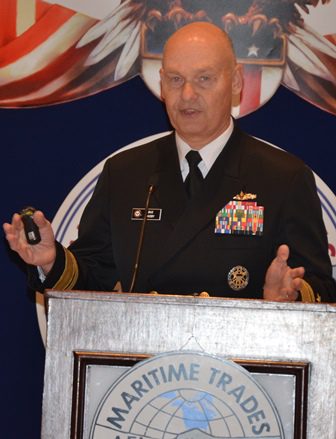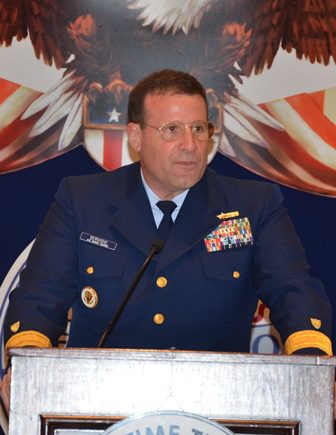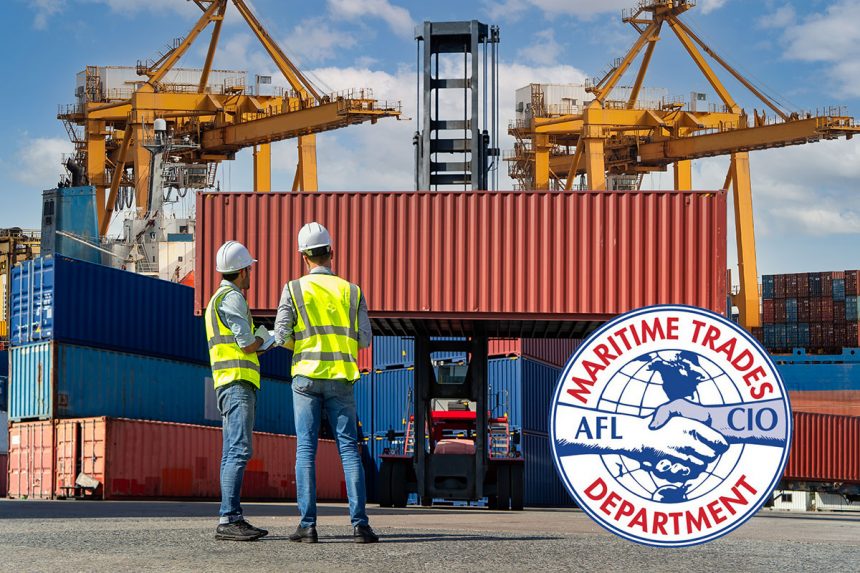
American mariners and their unions are valued partners and crucial assets for the country, said two high-ranking military officers in recent remarks to the Maritime Trades Department (MTD), AFL-CIO executive board.
Rear Admiral Mark Buzby, commander, U.S. Military Sealift Command (MSC), and Rear Admiral Joseph Servidio, assistant commandant for prevention policy for the U.S. Coast Guard, addressed the board Feb. 21 near Orlando, Fla.
Buzby oversees an agency that operates more than 100 civilian-crewed military support ships, many of them with crews represented by MTD-affiliated unions. He addressed the board for the fourth straight year.
Buzby primarily discussed the potential effects of sequestration on parts of the maritime industry and then his recent voyage aboard the Navy’s first joint high-speed vessel (JHSV), the USNS Spearhead.
In the face of the wide-ranging federal cuts and furloughs, he stated, “I pledge to you that we’re going to do everything we possibly can to the benefit of our mariners – to keep them working and keep them from having a nickel taken away from them. They do such tremendous work for us, I owe it to them.”
Nevertheless, for the Navy as a whole, Buzby said he expects sequestration, combined with previous budget cuts for the current fiscal year, to “have a debilitating effect on us.”
Responding to pundits who have said the Defense Department should be able to handle the billions of dollars of cuts with minimal difficulty, Buzby declared, “We could easily absorb this if we had the options to absorb it in the right places. But when you’re forced to do it in specific places, or indiscriminately, it really has significant impact. That’s what’s causing us a lot of heartburn.”
He reviewed money-saving actions already taken by MSC and other steps being considered, including placing some ships in reduced operating status and cancelling all major exercises.
On a brighter note, Buzby described spending four days aboard the Spearhead, the first in a planned fleet of 10 JHSVs. He rode it from the Gulf Coast to Norfolk, Va., and said it’s a great boost to America’s sealift capability.
The Spearhead is “basically a big, fast box,” he said. “She can do a number of missions. It’s a tremendous ship manned by 22 mariners who are very highly trained, and let me tell you, they are having a ball. She was definitely worth the wait.”
Speed is a significant asset for the ships in this fleet, and the Spearhead, made of aluminum, can sail at 35 knots. It’s 338 feet long, 96 feet wide and can carry 600 tons of cargo in addition to more than 300 troops.
The Spearhead will host the change-of-command ceremony May 10 in Little Creek, Va., as Buzby completes his tour as MSC commander.

Servidio’s wide-ranging responsibilities at the Coast Guard include overseeing inspections and compliance, marine transportation systems, and commercial regulations and standards.
He covered three main topics in his speech: the Maritime Labor Convention, 2006 (MLC); the most recent amendments to the International Convention on Standards of Training, Certification and Watchkeeping for Seafarers (STCW); and maritime piracy.
Servidio described the MLC as “one of the most significant pieces of international legislation to come out of the United Nations system in the recent past.” It is known as a bill of rights for mariners.
He pointed out that it takes effect in August and serves as a revision and consolidation of 37 separate existing International Labor Organization conventions. While the U.S. meets or exceeds most if not all minimum standards in the new convention but hasn’t signed off on it, “that doesn’t mean we’re not interested in ratifying this most important convention…. I’ve made it a high priority within the Coast Guard to do what is necessary to move this to the Senate” so they’ll facilitate ratification, he explained.
After thanking Seafarers International Union Secretary-Treasurer David Heindel (who is also an official for the International Transport Workers’ Federation) for “his leadership and tremendously significant contributions to this most important effort” of advancing the MLC around the world, Servidio pointed out that if America doesn’t ratify it by August, U.S. ships will be subject to the convention’s standards when calling on nations that have approved it. For that reason, the Coast Guard will offer a certificate of voluntary compliance for qualified U.S.-flag vessels at their request.
Turning to the STCW convention, Servidio thanked maritime labor for providing valuable feedback that helped the agency avoid hastily issuing new regulations. Nevertheless, the amendments “require action by our government – in this case, the promulgation of regulations necessary to implement these amendments and to assure that U.S. seafarers and U.S. shipping maintain an equal footing with international competitors.”
Regulations for the final rule have been developed and “are going through the final stages of review within the government,” he said, adding that he expects them to be posted “in the very near future.”
Finally, he offered a detailed look at the Coast Guard’s anti-piracy work, and said that while significant progress has been made, piracy remains “an issue of grave concern to the U.S. and the Coast Guard and one that I know is of interest to all seafarers…. We can’t let our guard down.”
Speaking of maritime labor as a whole, Servidio stated, “We have continually enjoyed a collaborative relationship with our seafarer organizations…. Our partnerships with the maritime community at large reflect our commitment to protecting seafarers’ and (other) workers’ interests, which I personally discussed as recently as last fall when I met with many of the union leaders present today.”
He described union members as “the eyes and ears of our maritime community, and a vital component of any maritime safety and security system…. The Coast Guard is well aware of the contributions made by mariners in both our domestic and our international shipping, and how important shipping is to the U.S. economy. You play an instrumental role in keeping us safe and secure, and facilitating commerce and trade. I’m committed to making sure we do good by you, because you do good by us.”

